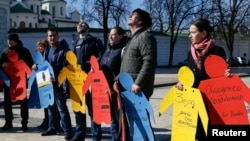A United Nations report finds a sharp deterioration in the human rights situation in Crimea since Russia annexed the Ukrainian peninsula in March 2014, triggering the biggest crisis between Russia and the West since the end of the Cold War.
In the most comprehensive report to date on Russian-occupied Crimea, the U.N. Human Rights Office report documents grave human rights violations between February 2014 and September 2017. It finds Russia, as the occupying power, to be in breach of multiple international humanitarian and human rights laws.
The report says most of these violations, including arbitrary arrests and detention, enforced disappearances, torture and ill-treatment, involve members of the security forces and Crimean self-defense, and have not been effectively investigated.
It says there is no accountability for these crimes, so violations continue with impunity. The head of the Human Rights Monitoring Mission in Ukraine, Fiona Frazer, said dissent and criticism are not tolerated by Russian Federation authorities in Crimea.
“One way that is manifested is by the fact that criminal and administrative law that concerns offenses of separatism, terrorism and extremes are often used to stifle any such dissent and, also, in a way to restrict certain freedoms,” Frazer said.
Thousands of Crimean residents have refused to live under Russian rule and fled to the Ukrainian mainland. The report says tens of thousands more who continue to live on the peninsula and did not assume Russian citizenship face hardships.
It says they have limited access to or are prevented from getting jobs and health care. It says they are stripped of property and political rights. In some cases, it says even Ukrainian citizens have been forcibly deported from the only home they have ever known.
The U.N. monitors note the deportation of citizens of an occupied territory is prohibited under international humanitarian law.
The United States and European Union imposed sanctions on Russia following its annexation of Crimea, and expanded them after Moscow instigated and has militarily supported a separatist rebellion in eastern Ukraine.
Russian officials argue Crimea was historically always a part of Russia. It was transferred to what was then the Ukrainian SSR by then Soviet leader Nikita Khrushchev in 1954.




